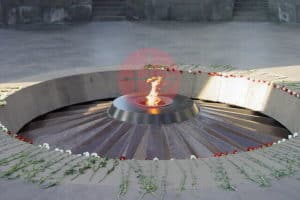Armenia feels forgotten, betrayed by international community
ON NOVEMBER 9, an agreement was signed between Armenia, Azerbaijan and Russia with the aim of bringing to an end the military conflict over the disputed region of Nagorno-Karabakh. Many Armenians feel betrayed by the conditions of the armistice, under which Azerbaijan would retain control of the territories it has won during the recent war and Russian troops would be installed in Nagorno-Karabakh for a period of five years to maintain the peace. Aid to the Church in Need spoke about the situation with Father Bernardo de Nardo, a Latin-rite Catholic priest who has worked in Armenia the past three years.
What will be the consequences of Azerbaijan gaining control of these areas for the Armenian population living in them?
They will be living in a permanent climate of fear of a genocide, so consequently most of them will leave their homes and come to Armenia. The cultural and religious patrimony of the area is therefore in danger, and the churches could be destroyed or converted into mosques. Azerbaijan has already been denounced by Armenia for having destroyed a Christian seminary in Naxichevan, an action proved by videos showing tombs with their stone crosses being smashed. It is very likely the same thing will happen in Karabakh.

The conditions of the Armistice have not been well received in Armenia.
The people are very unhappy with the armistice. They see it as a betrayal of the thousands who have been killed and a complete abandonment of those Armenians living in Karabakh. The consequence for Armenia itself is a very grave political crisis, with the opposition parties calling for the resignation of the prime minister. It is likely that in the weeks to come there will be more protests in the streets. This will generate a climate of instability and a still greater crisis.
What are the underlying roots of this conflict, which already saw an earlier phase in the 1990s?
This goes back to the time of the Soviet Union, when Stalin divided up the various territories, favoring what he called ethnic mixing. He allocated the historically Armenian region of Karabakh to Azerbaijan, as an autonomous region within the Republic of Azerbaijan. With the fall of the Berlin Wall and the break-up of the Soviet Union, an anti-Armenian nationalism emerged within Azerbaijan. There were massacres of Armenians in a varcities, including Baku, the capital. In the face of this extremely fragile situation, Karabakh proclaimed its independence as an autonomous and majority Armenian region, but this was not recognized by Azerbaijan, and so war broke out between Azerbaijan and Armenia, which supported the independence of Karabakh. It resulted in the victory of Armenia and the declaration of independence of Karabakh, which in practice meant the tacit annexation of Karabakh to Armenia.
Armenia is always remembered in connection with the genocide of 1915. Does the genocide still scar the population?
The genocide has left many scars on the population, the greatest of them being the horrible sense of injustice, of suffering such an atrocity and at the same time one that is completely denied by its perpetrators. You can see the constant clamor for justice in daily conversations and in the annual commemorations of the event.
How are Armenians affected by the present conflict?
The current conflict is affecting all Armenians and in many different ways, the first being the devastation of those families who have lost family members in the war or had them return mutilated. Poverty has been exacerbated, owing to the priority given to military expenditure and the number of refugees who have flooded in from Karabakh to many towns and cities. The local families are taking in relatives, friends, and others as best they can, and this, too, is adding to the suffering. And all this has come on top of the already existing unemployment caused by the coronavirus pandemic and above all due to the lack of the usual income from tourism.
What about the geopolitical dimensions of this war? Is there a religious dimension to this conflict, or is it purely a political one?
This war is exposing the hypocrisy of many governments, who, while promoting peace by their words, are selling arms. Moreover, it shows that they are far more interested in the oil and natural gas in these countries than in the lives of human beings. One can see a clear Islamic expansionism, supported by many states and desire to see the disappearance of ancient Christian populations in Asia, such as the Armenians.
Do the Armenians feel forgotten by the international community?
The Armenians feel forgotten and betrayed by the international community, which as always is more interested in geopolitical games than in truth, justice and peace. But I’d like to conclude with a message of hope: The Armenian people have always come back again from the midst of indescribable calamities, and they have done so in peace, without vengeance or bitterness, simply demanding justice and always from the hand of the merciful love of Jesus and Mary. And they will do so again this time, and it will once again be an example to the world.
—Maria Lozano

